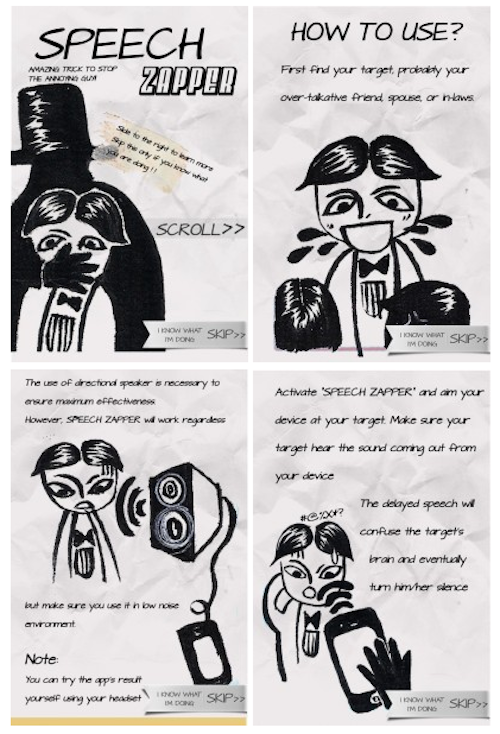
In a phenomenon known as Delayed Auditory Feedback, if your speech is played back to you with a slight delay—between 9.2 and 192 milliseconds later—it becomes quite difficult for you to continue to speak. There are some technological jamming variables: it is harder to read than extemporize, and the jam doesn’t trip up nonsense, if it’s unscripted. Japanese engineers Kazutaka Kurihara and Koji Tsukada have developed a portable device, the SpeechJammer: A System Utilizing Artificial Speech Disturbance with Delayed Auditory Feedback, that one may point at others for the on-the-go fumble effect. Crowd control, I suppose, will prove its optimal ideological aim, though to our home audience it is naturally being presented as an effective cure for that more individual annoyance—the bothersome relative, the cubicle chatterbox, the loud fellow traveler. ‘Nuff said, all around. Me, I am sore bored with technology qua technology. I have no love inherent of the machine without genuine interiority. By which I mean less an over-stuffed soul and more real leather seats. It is April, and it is National Poetry Month. Thus, the dash is burled oak, and the fixtures solid brass. But it’s a real workhorse for all that. As you can see from where you’re sitting, during our National Poetry Month countless flatbeds full of words will be duly and dully trucked in to various platforms, unloaded by the likes of us, that is to say me, for you to read or ignore, or tuck somewhere back of your own epiglottis, to be hacked out later, beautifully remasticated. Then composted and put in small glass jars for others to enjoy with toast. I have read elsewhere that there are more producers of poetry than consumers of poetry. As if there is a difference. As if this was sad. But it is a happy fact for Poetry that we have become cannibals of such meager appetites that, like in old New Yorker cartoons, we keep our pots perpetually stocked with white hunters in pith helmets. Other stock characters, in other words. And it is as one such a consumer that I am producing here. In order for another consumer to produce something of some similar insignificance. Something that smells of the machine but still reeks of Poetry. Conceptualism, or at least its Northern American variant, has frequently, or at least publically, celebrated technology, or at least technology of the digital variety, as prompt and promoter of its advent. Again, at least in North America, which may include Mexico, for purposes of our moment. In this, the subordinate clause is the sanity clause, as the Marx brothers knew. Still, the larger point remains: machines can and do make Poetry and have since Breton’s first attempts at automatic writing through the OULIPO’s more strenuous mathematical efforts to the random assignations of Issue 1, in which 3,164 famous or at least named (and what is fame if not a name) poets were randomly matched to the same number of other-authored poems. Causing two primary modes of kickback: the overt, wherein named author immediately rejected authorship, crying harm and therefore foul, and the covert, wherein named author retroactively claimed authorship, crying no harm and therefore no foul. Each in its own way missing the more poetic point: how can we preserve the precious nick of harm, embrace the fair foul? For if poetry is to be anything, it must be at least capable of being violated. First, there is the large matter of critical evaluation, which demands aesthetic parameters. These move, by the way. Second, anything worth having is worth destroying, and vice versa. It is a sorry art that cannot inspire the sort of blindly destructive lover’s rage that Russian ballet, for example, commands. And technology qua verse is eventually as listlessly sentimental as any other form of mindless lineation—after all, when The New York Times is generating haiku algorithmically, it’s time to hang up your dancing shoes. No, the machine is insufficiently malevolent, and most Poets love Poetry the way one loves a warm bath. That is to say, they may add a bit of their own water, but would not do as Celia must do in her dressing room. So for this National Poetry Month, and in honor of Poetry and all its Poets, I will take the liberty of posting a small series of anti-Poetry sentiments.[i] Screeds, if I feel ambitious. Which may, with luck, serve as a kind of minimal drag, gently delaying the month’s laudatory feedbacks, with the sweet possibility of a fruitful jam. For, as you know, marmalade is tasty, if it’s very thickly spread.
[i] To be distinguished from Charles Bernstein’s 1999 essay, “Against National Poetry Month As Such,” in which he argued for an International Anti-Poetry Month, where all poetry would be removed from public consumption. (Like taking canapés from a baby.) I am altogether for National Poetry Month As Such. It’s Poetry As Such I’m against. And the As Such is hanging by a thread.
Poet and criminal defense attorney Vanessa Place earned a BA at the University of Massachusetts at Amherst...
Read Full Biography

